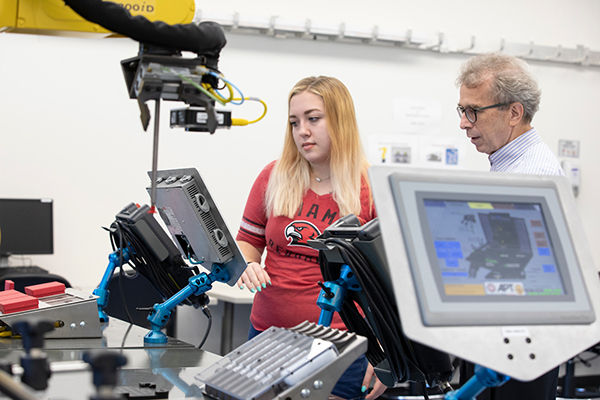Miami receives $1.49 million from the National Science Foundation to help students with financial needs obtain degrees in STEM-related fields
The NSF grant will provide pathways to academic upward mobility in engineering and computer-related degrees.

Miami receives $1.49 million from the National Science Foundation to help students with financial needs obtain degrees in STEM-related fields
Over the next six years, the grant will fund 132 scholarships for high-achieving students with demonstrated financial need to attend either the Oxford campus or Miami’s Regionals. The project is titled, “Supporting Student Success and Higher Degree Attainment in Engineering: A Scholars Comprehensive Strategy for Talented Low-Income Students.”
This collaborative grant between Miami’s Oxford and Regional campuses creates curricular pathways to advance from the associates to a bachelor’s level degree with the option of completing a master’s level degree program in engineering, computer information technology, mechanical engineering technology, mechanical and manufacturing engineering, and computer science.
"Nationwide, there is a critical need in the growing areas of computer science, advanced manufacturing, and robotics, but there is a gap in the current workforce and required skill-sets,” said Kumar Singh, who is a professor in the Department of Mechanical and Manufacturing Engineering and the grant’s principal investigator.
“Today’s industry is adopting higher levels of technology and automation creating more need for individuals with advanced education in these fields,” he said. “We need to find ways to eliminate the barriers many students face as they pursue higher education.”
The team is developing a multi-tier approach to provide students with not only financial assistance, but academic support and professional growth opportunities. Students face numerous challenges when working toward higher-level degrees, and it’s not only financial. Juggling coursework with full-time job and family responsibilities can make moving on to a bachelor’s and even a master’s degree seem impossible.
“What we’re doing is creating a system for better pathways to promote academic upward mobility,” Singh said.
Erasing barriers to academic access
Miami faculty from Oxford and the Regionals are working to erase those barriers by streamlining academic courses, cohort building, providing one-on-one mentorship, research opportunities, and connecting the students with industry for job opportunities.
“Dr. Singh and Dr. Khan have been passionate advocates for students who are in need of financial assistance by seeking out both federal and state grants to support them,” said Beena Sukumaran, Dean of Miami’s College of Engineering and Computing. “This National Science Foundation STEM grant will have a tremendous impact on the college. It aligns with our goals by providing access to diverse student populations.”
Singh and Fazeel Khan, also a professor in the Department of Manufacturing and Mechanical Engineering, recently launched a project to better align engineering programs at Miami with industry needs in robotics, automation, and advanced manufacturing through the university’s “Boldly Creative” Strategic Academic Enrichment Initiative.
Early this year, the two professors were among a team from Miami who received nearly $600,000 from the Ohio Department of Higher Education (ODHE) to help induct more students into Ohio’s workforce. This Choose Ohio First grant will recruit and support more than a dozen Ohio students per year studying robotics, manufacturing, or automation.
These grants are aligned with the mission of engineering and computing programs at Miami University to build a diverse student body and create the mechanisms that will enable their long-term success.
NSF Grant Team members
The grant’s multi-level approach includes faculty and academic experts from Oxford and the Regionals.
Co-principal investigators are Singh and Khan; Robert Davis, associate dean at the Regionals; and Rose Marie Ward, associate dean of the Graduate School.
Other faculty members involved in the project include Marianne Murphy, chair of Computer Information Technology (Regionals), Mert Bal, chair of engineering technology (Regionals); Daniela Inclezan, associate professor, Computer Science and Software Engineering, and Zhiyuan Yu, assistant professor of Engineering Technology (Regionals).